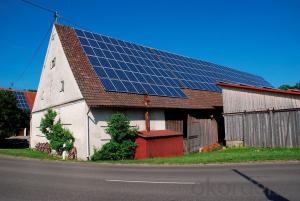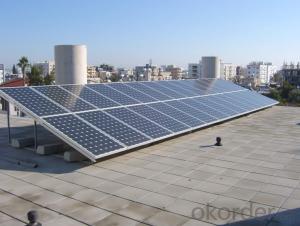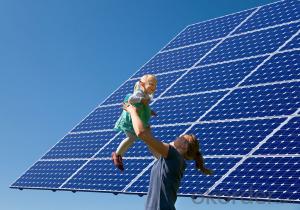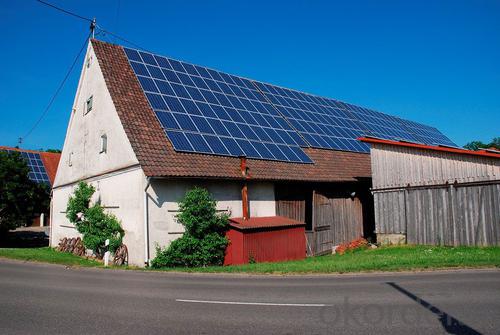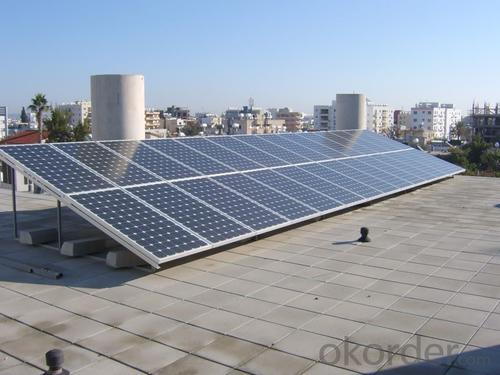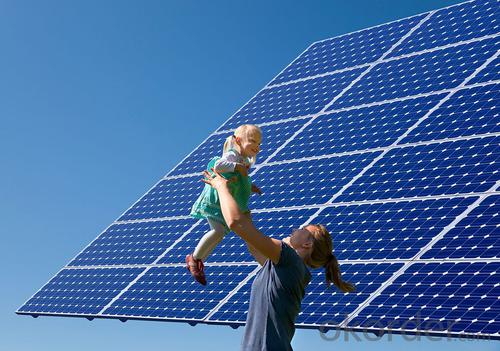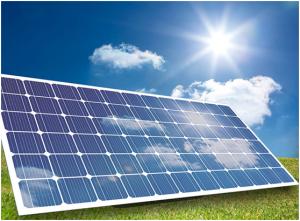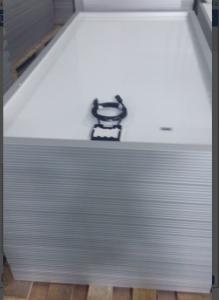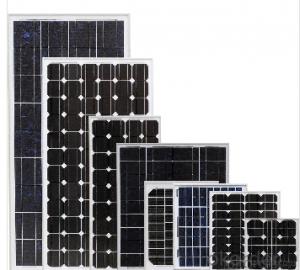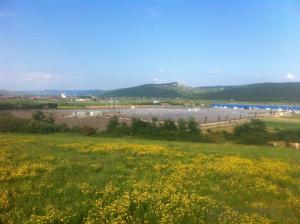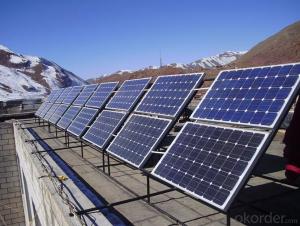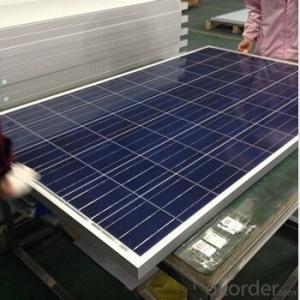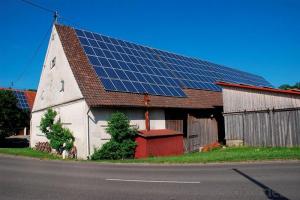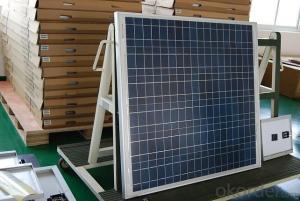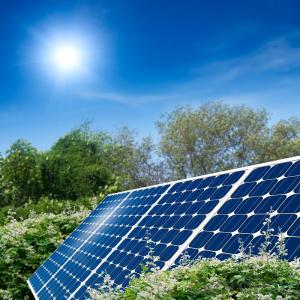CNBM Solar Monocrystalline 156 Series (20W) Solar Panels for Heating Pool
- Loading Port:
- China main port
- Payment Terms:
- TT OR LC
- Min Order Qty:
- 100000 watt
- Supply Capability:
- 10000000 watt/month
OKorder Service Pledge
OKorder Financial Service
You Might Also Like
About us
CNBM International Corp, established in 2004, is the business entity for trade and logistic of CNBM Group.With the advantages in Cement, Composite Materials, New Building Materials and Engineering, CNBM mainly concentrate on coal, steel and construction equipments and give priority to solar and wind energy development.CNBM International is highly recognized by its business partners and clients all over the world and has established good business relationship with the customers in over 120 countries and regions all over the world.
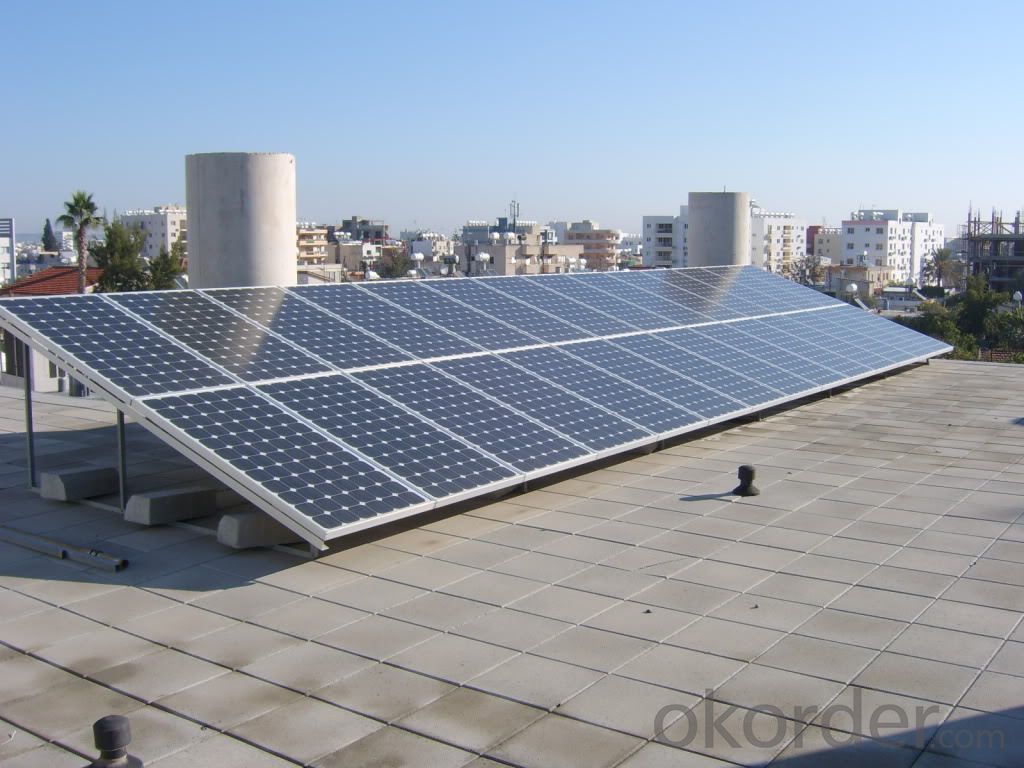
Data sheet
| Characteristics | |
| Max Power Voltage Vmp (V) | 17.2V |
| Max Power Current Imp (A) | 1.17A |
| Open Circuit Voltage Voc (V) | 22.2V |
| Short Circuit Current Isc (A) | 1.24A |
| Max Power Pm (W) | 20W |
| Temperature Coefficient of Cells | |
| NOCT | 47℃±2℃ |
| Temperature Coefficients of Isc (%/℃) | 0.06% |
| Temperature Coefficients of Voc (%/℃) | -0.32% |
| Temperature Coefficients of Pmp (%/℃) | -0.45% |
| Mechanical Data | |
| Type of Cells (mm) | Mono156×22.3 |
| Dimension | 490×350×25mm |
| Weight | 2kg |
| NO.of Cells and Connections | 2×8=16 |
| Limits | |
| Operating Temperature | –45°C to +80°C |
| Storage Temperature | –45°C to +80°C |
| Max System Voltage | 700V |
FAQ:
Q1: Why buy Materials & Equipment from OKorder.com?
A: All products offered byOKorder.com are carefully selected from China's most reliable manufacturing enterprises. Through its ISO certifications, OKorder.com adheres to the highest standards and a commitment to supply chain safety and customer satisfaction.
Q2: What is a solar PV module?
A: A solar PV module consists of many solar cells that are connected together (typically in series) and packaged in a frame (typically made of aluminum).
Q3: What are the advantages and disadvantages of monocrystalline solar PV modules?
A: Monocrystalline solar PV modules are the most efficient type of solar PV modules, with the exception of CdTe thin film solar PV modules. As a result, monocrystalline solar PV modules are more expensive when compared to almost all other types of solar PV modules.
Q4: What is the typical service life of a solar PV module?
A: The typical life of a PV module is 25 years. However, superior quality PV modules boast service lives up to 35-40 years (electrical generating capacity is often reduced, however by that point).
Q5: What certifications do you have?
A: We are specialized in the photovoltaic field, with a focus on solar cells, modules and photovoltaic power generation systems. We employ advanced monocrystalline and polycrystalline silicon solar cell manufacturing equipment, producing highly efficient and reliable products sold in Europe, the Americas and Australia. Our company has passed ISO9001 quality management system certification, and our products have obtained TUV-IEC, CE and ISO certification.
Q6: How do we guarantee the quality of our products?
A: We have established an advanced quality management system which conducts strict quality tests at every step, from raw materials to the final product. At the same time, we provide extensive follow-up service assurances as required.
Q7: How long can we receive the product after purchase?
A: Within three days of placing an order, we will begin production. The specific shipping date is dependent upon international and government factors, but is typically 7 to 10 workdays.
- Q: Are there any maintenance requirements for solar panels?
- Yes, solar panels do have maintenance requirements. While they are generally low maintenance, they need to be kept clean and free from debris to ensure optimal performance. Periodic inspections for any damage or shading issues are also recommended. Additionally, the electrical connections and inverters may require occasional maintenance or servicing.
- Q: Can solar panels be used to power a theme park?
- Yes, solar panels can be used to power a theme park. Solar energy is a renewable and sustainable source of power that can be harnessed to meet the energy needs of various establishments, including theme parks. By installing a sufficient number of solar panels, a theme park can generate enough electricity to power rides, lighting, and other facilities, while also reducing its carbon footprint and operating costs.
- Q: If a solar panel is a .5kW system, what length of time is it putting out that much power? Every hour?
- Power = work done/time taken In other words, Watts=Joules/second. In this respect, power is a little like speed (m/s). Your question is looking at a car with a 50mph top speed, and asking how long is it going that fast? The solar panel will produce .5KW for as long as you require it. Enough to boil a kettle, run a modest electric heater etc,
- Q: How do solar panels affect the homeowner's insurance policy?
- Solar panels can have an impact on a homeowner's insurance policy as they are considered an additional structure or improvement to the property. While they may increase the overall value of the home, they also introduce potential risks such as damage from storms or accidents. Homeowners should inform their insurance provider about the installation of solar panels to ensure adequate coverage and potentially adjust their policy accordingly.
- Q: Dear Friends, I am very much worried about Global warming, So to contribute something for reducing Global Warming I have decided to use Solar Panels. Can anybody tell me what is the price of these Solar Panels and why people are not using them when they are environment friendly. What are the Pros and Cons of these Solar Panels?
- here's lot of articles about the questions you just asked about solar panels, enjoy renewableenergyarticles.blogspot....
- Q: Can solar panels be installed on a small scale?
- Yes, solar panels can be installed on a small scale. In fact, many residential homes and small businesses have successfully installed solar panels to generate their own electricity and reduce their reliance on the grid. Additionally, small scale solar installations are more affordable and easier to manage compared to large-scale projects, making them an accessible option for individuals and communities looking to adopt renewable energy.
- Q: Are the solar panels on the roof just a gimik to get all the tree huggers to buy it, or are they actually a good, efficent design?
- Create okorder /
- Q: What is the most affordable, yet highest watt solar panels available?
- Those two requests are somewhat at odds with each other. Trina and Suntech make panels that are generally good value. You can search the web and find your best price. If this is for something that does not need to last long, you could get amorphous panels and save some money. But they will degrade quickly in a few months, then slowly over a few years.
- Q: Can solar panels be installed on a deck or patio?
- Yes, solar panels can be installed on a deck or patio. In fact, many homeowners choose to install solar panels on their outdoor spaces to maximize sunlight exposure and take advantage of the available space. However, it is important to consider the structural integrity of the deck or patio and ensure that it can support the weight of the solar panels. Additionally, local regulations and permits may be required before installation.
- Q: I would like to know how much a solar panel would cost for a wingspan of 208 ft for a plane
- That okorder /
Send your message to us
CNBM Solar Monocrystalline 156 Series (20W) Solar Panels for Heating Pool
- Loading Port:
- China main port
- Payment Terms:
- TT OR LC
- Min Order Qty:
- 100000 watt
- Supply Capability:
- 10000000 watt/month
OKorder Service Pledge
OKorder Financial Service
Similar products
Hot products
Hot Searches
